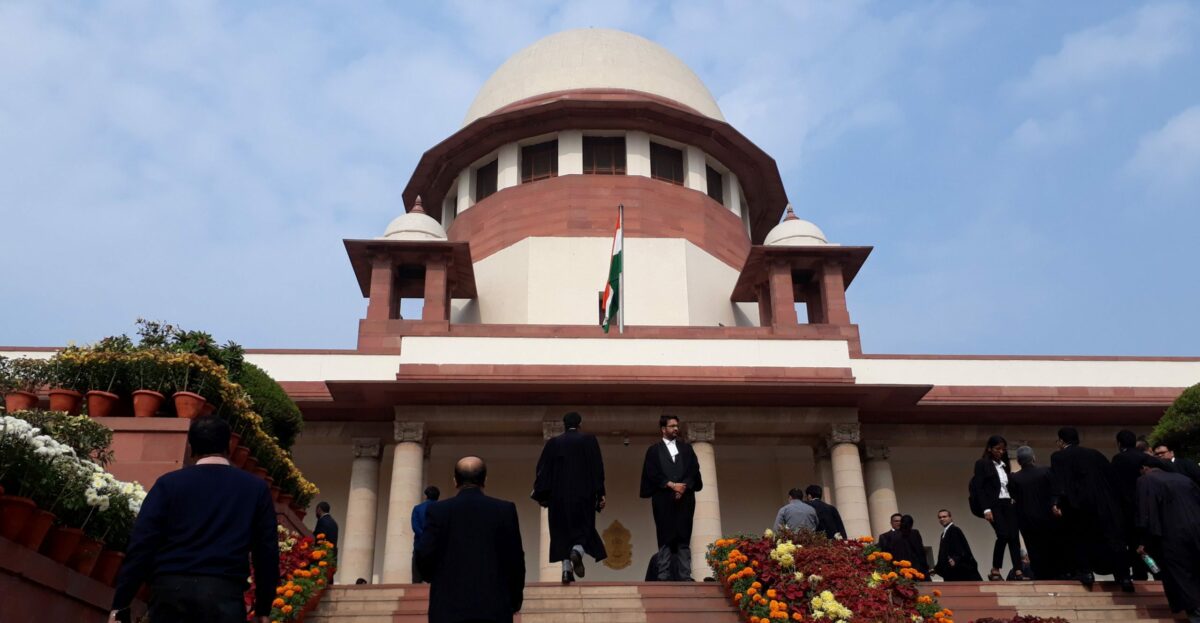The Supreme Court pointed out that the Bombay High Court did not examine the merits of the case properly and for finding a shortcut to decide.

The Supreme Court of India. (Wikimedia Commons)
The Supreme Court on Saturday, 15 October, suspended the Bombay High Court’s order acquitting former Delhi University professor GN Saibaba in a case charged under the Unlawful Activities (Prevention) Act or UAPA.
The high court had on Friday, 14 October acquitted, activist, and writer Saibaba, who was arrested in 2014, for having alleged Maoist links.
Besides Saibaba, the high court had also ordered the release of five others. Their acquittal, too, has been suspended.
Suspending the high court judgment, a Supreme Court bench comprising Justices MR Shah and Bela M Trivedi observed that the offenses were serious in nature. The bench, in a special sitting, also observed that the lower court had not properly examined the merits of the case.
A day earlier, the Bombay High Court had held the trial at the sessions’ court in Maharashtra’s Gadchiroli district as null and void.
The high court observed that valid sanction as required under Section 45 of UAPA, was not obtained.
The Supreme Court would further hear the case on 8 December 2022.
“Based on the discussions with the lawyer, I and my family will decide the future steps,” Saibaba’s wife AS Vasantha told South First.
The matter was listed before a bench of Justices DY Chandrachud and Hima Kohli on 14 October after Solicitor General Tushar Mehta made an urgent mention.
The bench, however, refused to suspend the high court order. Instead, it directed the case to be listed before an appropriate bench after seeking Chief Justice UU Lalit’s administrative approval.
“High Court has not considered the merits. High Court has discharged the accused only on the ground that sanction was invalid…” the court observed.
On the sessions court terming the offense very serious while convicting Saibaba and others, Justice Shah said, “The high court has also referred to some observations of the trial court, but has not considered them.”
During the hearing, Mehta referred to Section 465 of the Code of Criminal Procedure (CrPC) to point out that mere irregularities in sanction was not a ground for acquittal.
He submitted that while the first five accused persons were the foot soldiers, the sixth accused, Saibaba, was the mastermind.
Meanwhile, senior advocate R Basant appearing for Saibaba informed the court that there was no sanction on the date of cognizance or on the date of framing the charge.
After hearing both sides, Justice Shah said the court should hear accused one to five as well, after vacation.
Basant requested the court not to suspend the order, to which Justice Trivedi responded: “The high court has acquitted on the issue of sanction and without reversing the findings of the trial court.”
Basant also pointed out the 90% disability of wheelchair-bound Saibaba, along with multiple health ailments he has been facing.
“There are no criminal antecedents whatsoever for him. He is leading a respectable life and may be ideologically inclined. There is nothing to show his involvement,” he said.
Justice Shah, however, did not agree: “So far as terrorist or Maoist activities are concerned, the brain is more dangerous. Direct involvement is not necessary.”
Basant stuck to his point and responded, saying, “The SG says he is the brain, but there is nothing to show his involvement.”
Saibaba and the five other accused have been languishing in the jail for eight years and were convicted under UAPA in 2017.

May 17, 2024

May 16, 2024

May 16, 2024

May 16, 2024

May 16, 2024

May 15, 2024